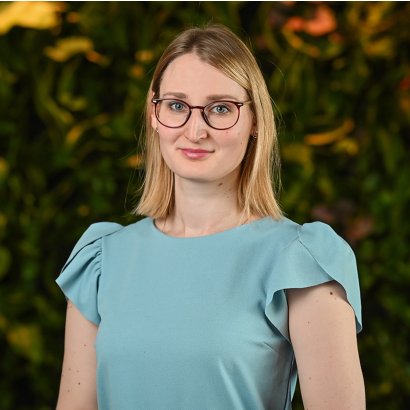
While the golden visa rules are still being finalised in Hungary, similar schemes have been popular in other EU countries for years. However, once the Hungarian rules have been finalised, the Hungarian Golden Visa will be highly competitive by EU standards.
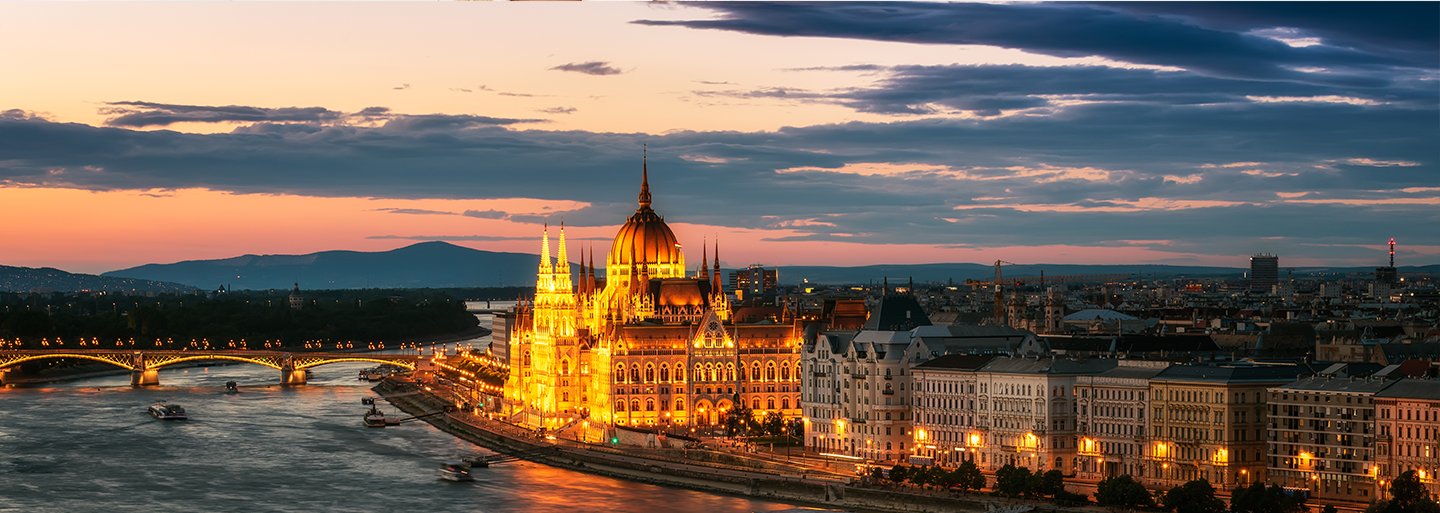
Even though the golden visa program has been officially with us since 1 July 2024, the procedure is not yet active in practice. This visa enables investors from outside the European Union (so-called third countries) to obtain a Hungarian residence permit in exchange for the acquisition of real estate, investment in a real estate fund or a financial donation to a higher education institution.
The reason why wealthy Chinese or Indian businessmen are not yet queueing up at the immigration authorities is down to a few details (the funds that can accept investments have not yet been approved and designated, and the possibility to invest in real estate is only available from 1 January 2025), but next year the rush is expected to start.
But will it really be a seizure? That depends largely on how the Hungarian programme can position itself in the EU competition for similar incentives. For now, it seems to be ahead of the game.
Many countries, many systems
16 countries in the European Union currently have some form of preferential scheme for third-country investors. However, the difficulty in comparing them is that the objectives (and therefore the criteria) that each country aims to achieve are very different. To simplify the rules a little, the benefit schemes fall into three categories: some countries, like Hungary, grant benefits (mostly residence permits, sometimes citizenship) based upon a passive investment in the given country as the sole criteria. Apart from Hungary, this includes Portugal, Greece and Malta. At the other end of the scale are those countries that have explicitly defined investor attraction programmes with the aim of economic enhancement and wealth creation. In many of these countries, there are no pre-defined, precise conditions for obtaining a residence permit, but the discretion to grant the benefit is left to the country itself. France, Germany and Austria are examples of countries in this category. In between these two extremes, there are a number of intermediate systems, where a simple passive investment is not enough, but which impose additional, more or less objective conditions.
The ranking of each country on the above scale is illustrated in the chart below:
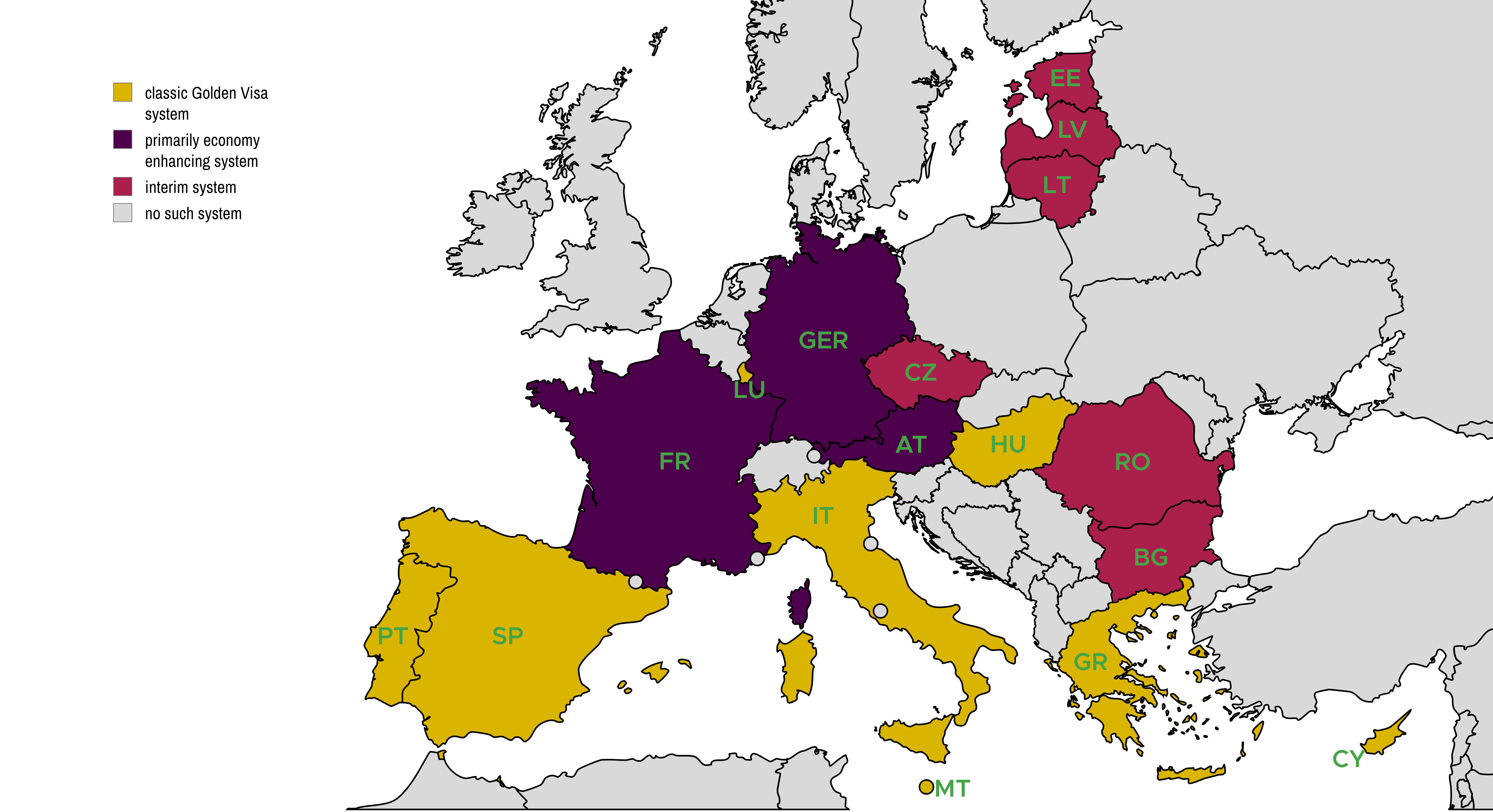
Investing in which form and how much?
The competitiveness of each Golden Visa scheme is strongly influenced by the nature and size of the investment required for the residence permit or citizenship. Lithuania offers the most favourable conditions in terms of the amount invested, where a non-EU national can obtain a residence permit with an investment of as little as €14,000 - but there are a number of other conditions for obtaining a permit.
There is great diversity in the types of available investments. Some countries (e.g. the Czech Republic, the Baltic countries, Italy or Luxembourg) prefer mainly company investments - whether in a listed company, a private company or a start-up. Investing in investment funds, government bonds or other financial market instruments is also a common option. Other countries prefer to transfer the assets of the investors into real estate or real estate funds (outside Hungary, this is the case in Malta, Cyprus, Greece and Spain). In several countries, donations to public charities are also possible (outside Hungary, this is also the case in Italy).
It should be noted that the classic golden visa countries have all recently restricted the conditions for obtaining a residence permit. For example, Portugal abolished the possibility of investing directly in real estate in 2023. And in Greece, another popular country, the investment thresholds have been raised in recent years and only in exceptional cases is an investment of EUR 250,000 sufficient. Taking this into account, the Hungarian Golden Visa scheme (where an investment of EUR 250,000 in a real estate fund or EUR 500,000 in direct real estate can qualify for the residence permit) looks very tempting.
The chart below illustrates the minimum level of investment by countries - including the type of investment that entitles you to the lowest investment amount.
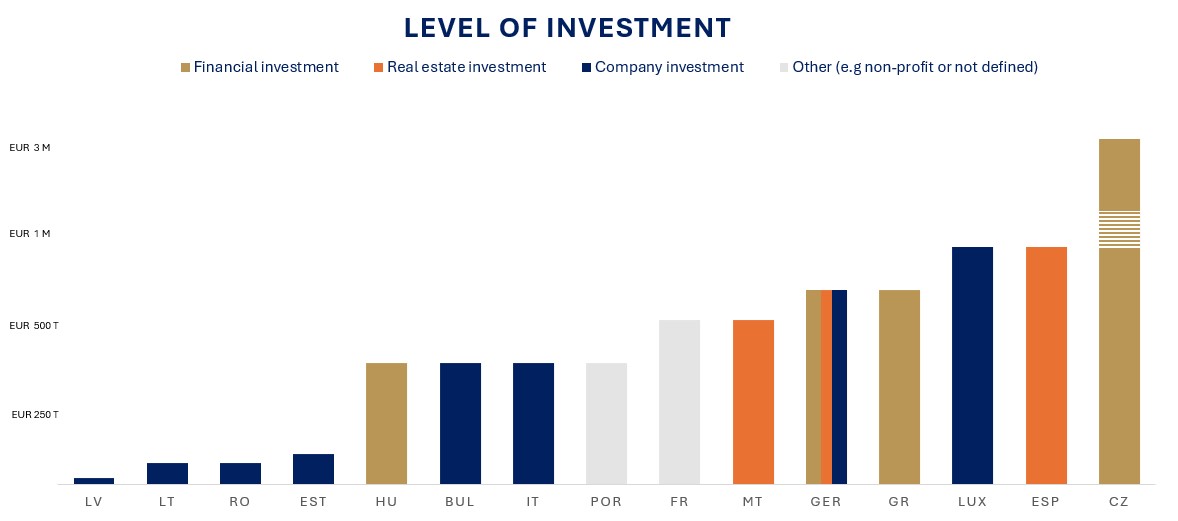
Citizenship or residence permit?
Most of the Golden Visa schemes offer investors a residence permit (including the Hungarian scheme), which comes with the right to move freely both within the country and within the EU, to settle and in many cases to work.
Other countries are already luring third-country investors with citizenship. Understandably, this gives foreigners much broader rights, as they can fully participate in the political and public life of the country. Citizenship is mainly granted by countries that do not expect foreigners to make only passive investments (e.g. Austria, Germany, Romania), but there are also intermediate systems (e.g. Italy or Spain) which, although granting residence permits based primarily on investment, 'convert' the benefit into citizenship after a certain period of time.
The discounts offered by each country are shown in the chart below: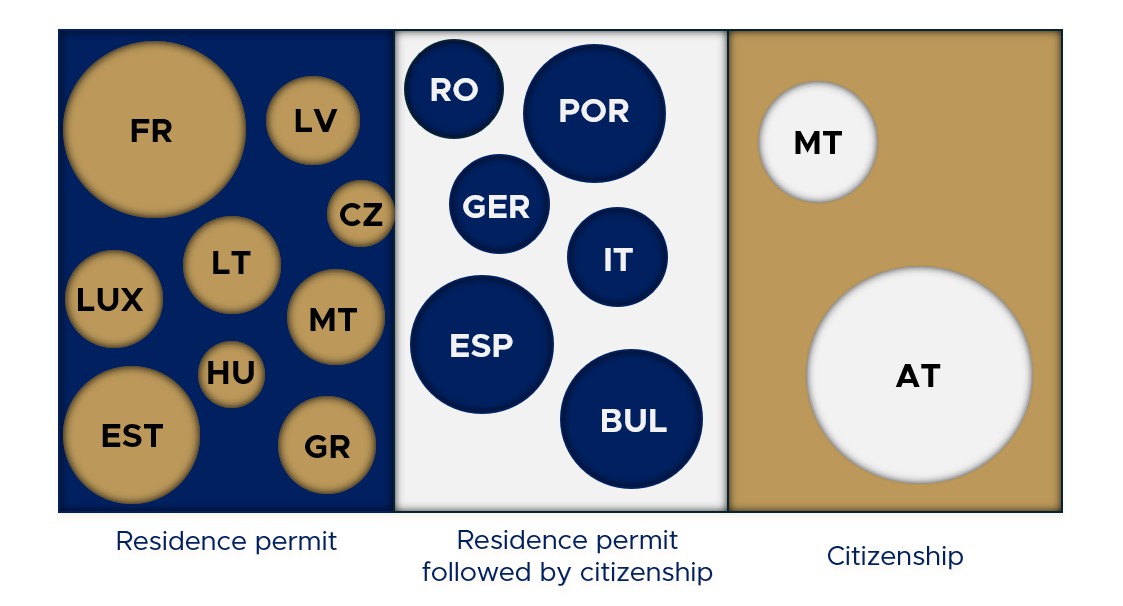
But how long should we wait?
The effectiveness of the Golden Visa regime is also greatly affected by the processing time - how long it takes for an applicant to obtain a residence permit or citizenship. At one end of the scale are Latvia and Spain, where applications are processed within 20-30 days. In Austria, on the other hand, it can take between 20 and 36 months (while in Germany there is no time limitation). In many cases, it is not the official deadline that matters: in the Czech Republic, for example, the procedural deadline is 30 days, but the procedure can take up to five months, while in Portugal, in practice, people who want to obtain a residence permit have to wait two to three years.
From this point of view, the 21-day deadline of the Hungarian system seems very tempting. The real question is to what extent this very short procedural time will be sustainable in practice.
The procedural deadlines in each country are illustrated in the following graph:
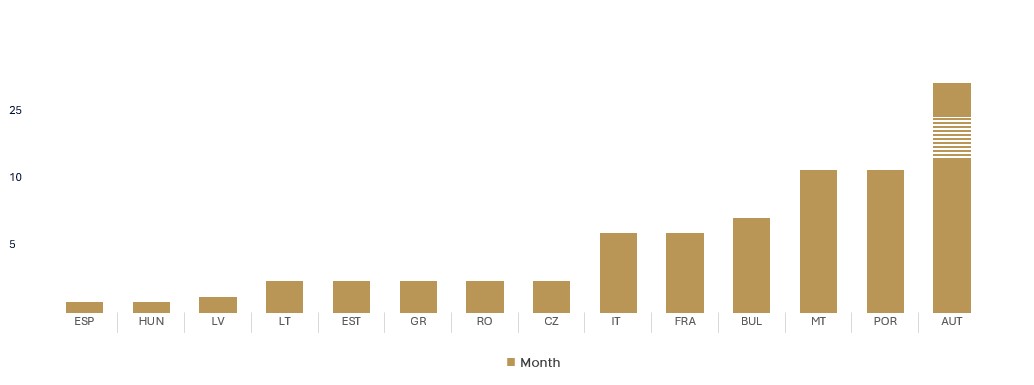
Where are we?
Once up and running, the Hungarian Golden Visa system is expected to be competitive by EU standards. The minimum investment threshold is low, foreigners have the possibility (at least under the current rules) to invest directly in real estate, the procedural timeframe is short and there are no additional conditions for third country investors beyond passive investment. While it is true that under the domestic system, nationality does not go hand in hand with preferential treatment, it is not expected to be the main criterion in the choice.
The following foreign law firms assisted in the preparation of this article:
- Austria: DORDA Rechtsanwälte GmbH
- Bulgaria: IY Law (Ilieva & Yordanov Attorneys at Law)
- Czech Republic: HAVEL & PARTNERS s.r.o.
- Estonia, Latvia and Lithuania: Sorainen Law Firm
- France: Reinhart Marville Torre, société d’avocats
- Greece: A. & K. Metaxopoulos and Partners Law Firm
- Luxembourg: LUTGEN+ASSOCIES
- Malta: Acumum Legal &Advisory
- Germany: Kanzlei HEUKING
- Italy: BonelliErede - Law Firm
- Portugal: Valadas Coriel & Associados
- Romania: STRATULAT ALBULESCU Attorneys at law
- Spain: Juárez y Asociados
Here you can find a comparative table containing other investment related residence programs in the EU. This document was prepared with the involvement of other independent EU based law firms.




